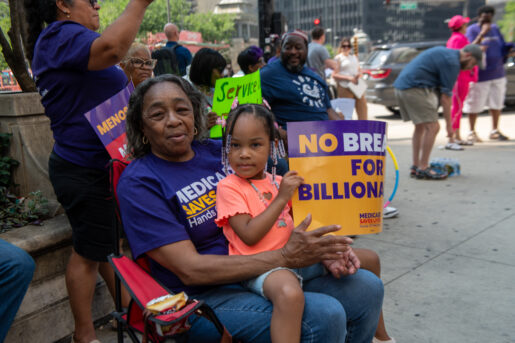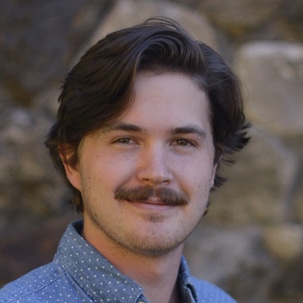Health and home care workers protest cuts to Medicaid: ‘It’s not a luxury; it’s a necessity’

Rebekah Mahon, an Illinois Division of Rehabilitation Services personal assistant and single mother, relies on Medicaid and SNAP (the Supplemental Nutrition Assistance Program) to support herself and her 2-year-old child. Recently, though, she says she lost her SNAP benefits when her income exceeded the eligibility limit by just $15.
“I work almost 60 hours a week, and I still can’t afford to put food on the table,” Mahon says. “The myth that you have to work really hard in order to make a living is just not true.”
On July 15, Mahon joined dozens of other healthcare workers and disability rights advocates on North Wabash Avenue, across from Trump Tower, to protest the largest Medicaid cuts in history under President Trump’s One Big Beautiful Bill Act. Home care workers, represented by the union SEIU Healthcare, along with advocates from disability nonprofit Access Living expressed their outrage at funding cuts to Medicaid, SNAP, reduced-price school lunches, and FEMA.

They blocked traffic in front of Trump Tower, holding signs “No Breaks for Billionaires” and chanting “Hands off Medicaid, hands off SNAP.” But not only were they protesting the cuts, but calling for solutions, encouraging Illinois lawmakers to offset cuts by taking the ultra-rich.
Across Illinois, Medicaid — a joint federal and state program — provides health coverage for people with limited income. According to the Illinois Department of Healthcare and Family Services (HFS), 3.4 million people in Illinois enrolled in Medicaid in 2024. Nearly half of those enrolled, 44%, are children.
Illinois could lose between $24 billion and $39 billion in federal funding from 2026 to 2034 due to cuts from Congress and the Trump administration, according to HFS projections. Cuts of this significance would force Illinois to limit benefits for people with disabilities, seniors, children, and pregnant people. Meanwhile, the act moves $170 billion to immigration enforcement.

Ana Navedo, a home care worker, depends on Medicaid to support her son, José. After working as a Chicago police officer for seven years, José suffered two severe strokes and lost function on the left side of his body.
Medicaid covers Navedo’s own healthcare needs as well as those of her family, including other relatives with disabilities, in addition to José.
“It’s not a luxury; it’s a necessity,” Navedo says.
For people like José, who require extra services such as medication and physical therapy, cuts of this magnitude will severely impact access to healthcare due to the high cost of treatments.
“If we were to pay out of pocket for these services ourselves, it would cost more than $6,000 a month,” Navedo says.
Additionally, if businesses cut home care workers’ hours due to a lack of funding, Navedo’s salary will be reduced. An estimated 50,000 Illinois workers — many of whom also rely on Medicaid — will lose their jobs due to the funding cuts. Illinois’ rural hospitals are the most immediately at risk, with nine (11%) potentially closing due to the cuts in the next two years, and 17 potentially closing within the decade.

Jaqueline Rodriguez, SEIU Healthcare vice president for home care, addressed the group of demonstrators outside Trump Tower. She said Illinois needs to come together to demand a resolution to such harmful legislation.
“We call on the president and Congress to rethink this,” Rodriguez said at the press conference. “Healthcare is a human right, and it is horrible that because of this bill, it is going to be dismantled.”
Mahon says community organizing and keeping one another safe can make a difference.
“I want to do everything that’s within my power to help my community,” Mahon says. “No matter how little you think your part is, we’re all in this together. The power is in the people.”

Ezra Maille is a freelance reporter currently wrapping up a master’s degree in journalism from Northwestern’s Medill School. He is passionate about environmental justice, something that drew him to studying social justice and solutions journalism at Medill and approach stories through a solutions-oriented lens.










